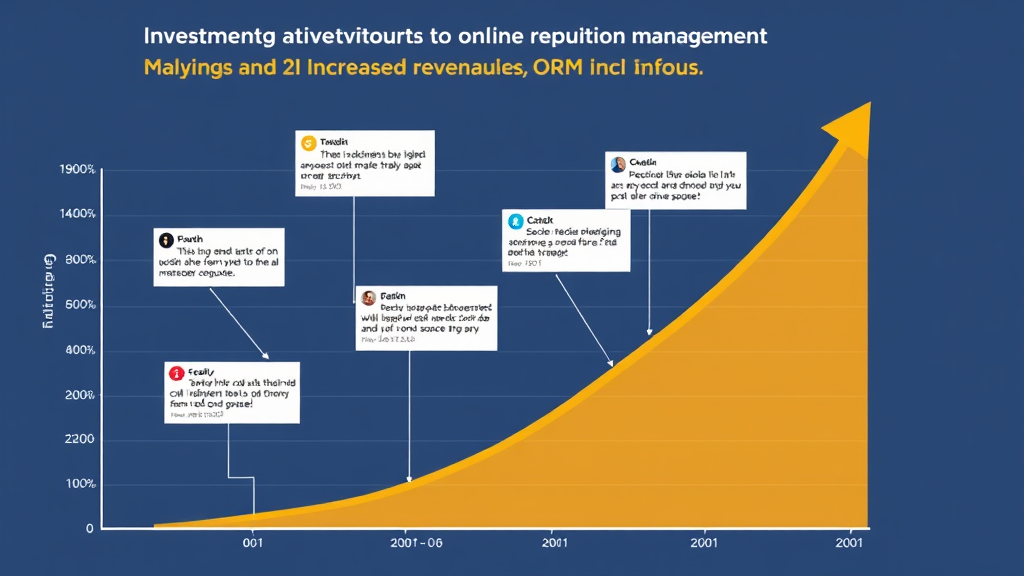Online reputation management (ORM) ROI is more than just a buzzword. Businesses know that a solid online image can translate directly into sales (more customers, more profits).
When customers see positive reviews, trust follows. They’re drawn to brands that have a good reputation, like moths to a flame. If your brand has a positive online presence, it’s easier to turn clicks into loyal customers.
ORM is about controlling what people see, which means controlling potential revenue. Think about it—good reviews help build trust. Stick around to see why ORM matters for success.
Key Takeaway
- Managing your online reputation can lead to more sales.
- A good reputation helps keep customers coming back.
- Knowing your ROI can help you spend money wisely on reputation efforts.
What is Online Reputation Management (ORM) ROI?
Online Reputation Management (ORM) is like tuning into a live conversation to hear what’s being said about a business. By monitoring online chatter, companies can shape their response. The ROI (Return on Investment) tells how much profit is made compared to what’s spent on managing that reputation. When a business works on its reputation online, it can lead to more trust and higher sales.
A business with a 5-star rating on review sites is more likely to pull in customers than one with a 2-star rating. Positive reviews can lead to stronger brand perception. Customers trust those higher ratings, and this trust usually leads to more sales. A solid digital presence means more visibility. More visibility means more customers—simple as that.
The Impact of ORM on Revenue
ORM can drive up a brand’s revenue in real ways. A good online reputation can increase sales, particularly when reviews are glowing. Research shows that customers tend to convert more when they read good things about a brand. [1]
When a business is well-known for good service, it can even charge more. This is because customers assume higher-priced products are worth it, simply due to the positive reputation. Plus, happy customers are repeat customers. A business with a strong reputation sees more loyalty, meaning customers will stick around for future purchases.
Cost Savings from ORM
Managing an online reputation doesn’t just drive profit—it can save businesses money, too. One of the key ways it does this is through crisis prevention. When a brand identifies potential issues early on, it can address them before they escalate. This means less damage and, ultimately, lower costs. [2]
Another way ORM saves money is through software tools. Using ORM software helps businesses streamline their reputation management process. They can track reviews across multiple platforms, all from one place. This reduces the need for constant manual checks on each site.
Also, a strong online reputation can boost organic traffic. With good reviews and a solid digital presence, businesses can attract more customers without sinking extra money into ads. This creates a self-sustaining cycle, cutting down advertising costs while increasing customer trust.
Measuring Your ORM ROI
Credits: WebPunch
To measure how well ORM is working, there are a few steps businesses can take:
- Determine baseline metrics: Look at current revenue and customer acquisition costs.
- Estimate potential losses: Understand how much could be lost if the online reputation is not maintained.
- Project potential gains: How much more could be earned with a better reputation?
- Calculate investment costs: Include costs for ORM software and staff.
- Apply the ROI formula: ROI=(Projected additional revenue Prevented losses – Investment) / Investment × 100.
Following these steps helps businesses understand the real value of their ORM efforts.
Benefits of Knowing Your ORM ROI
Understanding ORM ROI offers businesses a significant edge. It allows companies to justify their investment in online reputation management. When a business can show that ORM brings in measurable money, getting budget approval becomes easier. Plus, knowing which ORM strategies work best allows brands to direct their focus to the most effective tactics.
For instance, a company might discover that quickly responding to negative reviews boosts customer satisfaction. This insight allows for more effective strategy optimization. Tracking ORM ROI means businesses can stay ahead of the competition by understanding the direct financial impact of their reputation efforts. Making informed decisions based on real data is key to staying relevant.
The Challenges of Measuring ORM ROI

Measuring ORM ROI isn’t always straightforward. There are a few challenges:
- Attribution complexity: It’s difficult to directly link sales to specific ORM efforts. For instance, great reviews may boost sales, but pinpointing the exact impact is tricky.
- Delayed benefits: ORM results often take time to show. A positive reputation builds gradually, making immediate, measurable outcomes hard to assess.
- Tracking over time: Improved brand perception is valuable but hard to measure in concrete numbers. Businesses need to track success metrics consistently to truly gauge the long-term effects.
These hurdles make measuring ORM ROI a challenge, but they’re essential for understanding the full impact of a brand’s online reputation.
FAQ
How do reviews shape your bottom line?
Think of star ratings and online reviews as your digital storefront. Businesses with great ratings usually see their sales growth jump up by 18%. When customers see lots of 4-5 star ratings, they’re more likely to buy from you. But watch out – bad reviews can cut your revenue impact by up to 22%.
Why do happy customers stick around?
Customer sentiment is like a temperature check for your brand loyalty. When people feel good about your brand, they keep coming back. These happy customers become your biggest fans, spreading the word to others. This kind of word-of-mouth can actually slash your customer acquisition cost to one-fifth of what you’d normally spend.
Can watching social media save your reputation?
Think of reputation monitoring and social media monitoring as your early warning system. By keeping an eye on what people are saying online, you can catch small problems before they become big headaches. This watchful approach helps keep brand trust strong and saves you from expensive reputation risk and repair work later.
How do you know if your reputation work is paying off?
Reputation analytics and reputation metrics are like your report card. They help you track things like website traffic, conversion rates, and how well you keep customers. When you look at these numbers along with your reputation score, you can see if your reputation work is worth the money.
Does being online everywhere help grow your business?
A strong digital presence is like having stores in every popular mall. Good search engine results and smart online presence management help more people know about you. Companies that show up well online usually grab more market share and pull ahead of their competition, giving them a real competitive advantage.
Why do great customer experiences matter for your wallet?
Think of customer experience as a long-term investment. When you care about customer feedback and keep customer satisfaction high, people spend more money with you over time, boosting their customer lifetime value. Happy customers don’t just spend more – they stick around and tell their friends about you.
How do you protect your brand when things go wrong?
Having a reputation strategy is like having insurance for your brand equity. When you add good crisis management, you’re ready for anything. Together, they help keep customer trust strong, even when times get tough.
Can fixing your online image get more clicks?
When you work on reputation enhancement and online reputation repair, more people tend to click on your links. Think of it this way: people click more on names they trust, so better click-through rates often follow a better digital reputation.
How do you use data to build a better reputation?
Reputation intelligence and sentiment analysis are like having a compass for your reputation optimization. By understanding customer perception and online sentiment, you can make smarter choices about improving your reputation.
Does a strong online brand save money on marketing?
Good digital brand management often means spending less to get new customers. When your brand reputation management is strong, you naturally attract more leads through brand advocacy and positive buzz, cutting your marketing costs.
Why check your reputation regularly?
Think of reputation assessment and reputation audit as regular health check-ups for your reputation marketing. They show you what’s working and what needs fixing in your online brand protection strategy.
How does being trustworthy help with customers?
Brand credibility is the foundation of good customer relationship management. When people trust you, they stick around longer, leading to stronger customer loyalty and better long-term relationships.
What happens when you manage your online reputation?
Active digital reputation management usually gives your brand reputation score a boost. By watching online brand mentions and managing your online presence well, you can improve how people see and rate your brand.
Why does reputation matter for trust?
Your reputation impact directly affects whether customers trust you. Strong online reputation protection and steady reputation enhancement help build customer trust, which drives your success.
Do social interactions lead to sales?
Higher engagement rates often mean people like what they see. When folks interact more with your content and brand mentions, you usually get more leads. This shows how good brand perception and social engagement can turn into real business opportunities.
Conclusion
Understanding ORM ROI is key for any business. A strong online presence can drive higher sales, boost customer loyalty, and save money on marketing. While measuring ORM ROI can be challenging, the benefits are clear. It prevents crises, increases visibility, and helps grow a business’s reputation.
Starting an ORM strategy today can have a lasting impact on success, making it a valuable investment for businesses looking to thrive in a competitive market.
References
- https://thebestreputation.com/online-reputation-management/measuring-the-roi-of-online-reputation-management/
- https://reputation.com/resources/reports-research/the-roi-of-orm-measuring-the-financial-impact-of-your-online-reputation/
Related Articles
- https://newswirejet.com/reputation-repair/
- https://newswirejet.com/online-reputation/
- https://newswirejet.com/online-reputation-management-metrics-and-analytics/








